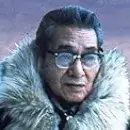
Howard Rock, Uyaġak (Rock)
Howard Rock, Uyaġak (Rock) was an Iñupiaq newspaper editor, activist, and artist, best known for his artwork and for founding the first regular statewide Alaska Native newspaper.
Born at Point Hope, a historic Iñupiat Eskimo village along the Chukchi Sea of Northwest Alaska, he learned to sketch and paint at the White Mountain Vocational School in Nome and later studied art at the University of Washington. He served as a radio operator in North Africa during World War II, and worked as a jewelry designer and ivory carver in Seattle.
In 1961, he returned to Point Hope and became a community spokesman during the opposition to Project Chariot, a federal plan to detonate nuclear bombs to create an artificial harbor nearby. In 1962, the Arctic Slope Native Association approached him to form a newspaper, and in October 1962 The Tundra Times began publication, with Rock as editor and publisher. Despite a lack of previous journalism experience, the newspaper’s circulation grew to 3,500 under his leadership, providing a widely respected platform for Native voices and supporting Alaska’s land claims movement and civil rights causes. During his fourteen-year tenure at the newspaper, The Tundra Times played a key role in uniting Alaska’s Native communities, contributing to the passage of the Alaska Native Claims Settlement Act of 1971, which awarded $963 million and 44 million acres to Native Alaskans.
Rock also served on the Indian Arts and Crafts Board for the Department of the Interior and helped establish the Institute of Alaska Native Arts. He received an honorary doctorate from the University of Alaska, Anchorage in April 1974, was voted “Alaskan Man of the Year” in 1974, and was named “49er of the Year” in 1975. The Tundra Times was nominated for a Pulitzer Prize for public service in 1975.